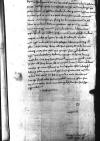Intellexi Reverendissimam Dominationem Vestram destinasse navigio ire in ⌊Marieburgum⌋ pro futuro ⌊conventu⌋ ad 1536-05-08⌊festum divi Stanislai1536-05-08⌋ in aedesque serenissimi ⌊regis⌋ meae tenutae divertere. Quod ut Reverendissima Dominatio Vestra faciat, obnixe precor. Parabo me comitem itineris, etiam navigio pro solitaque sua humanitate panem et sal libare et, quae Deus dederit, me gratificare erga Reverendissimam Dominationem Vestram conabor. Utinam et reverendissimus ⌊episcopus Warmiensis⌋, quem mala valetudine laborare dicunt, posset ⌊Mariaeburgi⌋ constitui. Prospicio mentem pronam esse, nis written over ...⌈... illegible⌈...... illegible⌉ss written over ...⌉i imbecillitas corporis vetabit etc.
Hesterno die mihi litterae redditae sunt ex ⌊Vilna⌋ ⌊maiestatem regiam⌋ morbo pedum, seu potius podagra, laborare portatusque est sella in ecclesiam. Nuntius ⌊Thurcae⌋ nondum fuit expeditus et nuntii
Livoniens(ium) or Livoniens(es)⌈Livoniens(ium)Livoniens(ium) or Livoniens(es)⌉
nonnumquam causas suas agunt apud reverendissimum ⌊episcopum Plocensem⌋ propter imbecillitatem regiam.
I(n)teri(m) ⌊Christophorus Chotkovicz⌋, magnae spei adolescens Lituanus, mortem obiit. Cuius funus secuti sunt serenissimus ⌊rex iunior⌋ et ⌊reginalis maiestas⌋. Sic fato omnes sumus obnoxii, alias non occurrerit.
Dicitur ⌊Culmensem nobilitatem⌋ armatos esse contra ⌊consiliarios⌋, sed
cf. Vulg. 2Sm 17.14 Domini autem nutu dissipatum est consilium Ahitofel ⌊Deus dissipabit consilium ⌊Achitophel⌋cf. Vulg. 2Sm 17.14 Domini autem nutu dissipatum est consilium Ahitofel ⌋. ⌊Ludovicus⌋ scriba ex ⌊arce Mariaeburgensi⌋ Dominica praeterita rediit ex ⌊Vilna⌋, qui has litteras attulit.
Cum his me Reverendissimae Dominationi Vestrae unice commendo. Quam Deus Optimus felicissime valere faciat. Cuius salutem votis meis assidue precor.


 AAWO, AB, D. 8, f. 65v
AAWO, AB, D. 8, f. 65v